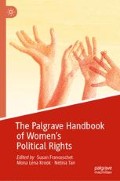Abstract
Zimbabwe adopted a proportional representation electoral system for its bicameral parliament after gaining independence in 1980. It later replaced it with an executive presidential system and a unicameral parliament in 1987. Both systems failed to produce a gender-balanced legislature. Zimbabwe ratified the CEDAW and adopted the SADC Gender Protocol in 1991. Zimbabwean women comprised 36% in the legislature—47.5% in the Senate and 28% in the influential House of Assembly by 2013. Gaidzanwa argues that women’s representation is likely to decline despite ten years of affirmative action to allocate 60 seats to women in the House of Assembly. More needs to be done to achieve gender equity in political representation in Zimbabwe.
Access this chapter
Tax calculation will be finalised at checkout
Purchases are for personal use only
References
Abdullah, H. 1995. Wifeism and Activism: The Nigerian Women’s Movement. In The Challenges of Local Feminism: Women’s Movements in Global Perspective, ed. A. Basu and McGrory, 209–225. Boulder, CO: Westview Press.
Cheater, A.P. 1986. The Role and Position of Women in Pre-colonial Zimbabwe. In Zambezia XIII (ii): 65–79.
Clarke, M., and P. Nyathi. 2012. Lozikeyi Dlodlo: Queen of the Ndebele. Bulawayo: Amagugu Publishers.
Dube, R. 2013.Parliamentary Performance and Gender. Harare: RAU.
Gaidzanwa, R.B. 1998. Gender Policy in the Public Sector. In Zimbabwe Post-independence Public Administration: Management Policy Issues and Constraints, ed. S. Agere, 247–267. Dakar: CODESRIA.
Gaidzanwa, R.B. 2013. Beyond Income: Gendered Well-Being and Poverty in Zimbabwe. InMoving Zimbabwe Forward: Understanding Poverty, Promoting Well-Being and Sustainable Development in Zimbabwe. Harare: Institute of Environmental Studies. University of Zimbabwe.
Holm, G. WLSA/DANIDA. Ministry of Foreign Affairs. 1994: 36.
Human Rights Watch. 2011.Perpetual Fear, Impunity and Cycles of Violence in Zimbabwe. New York, NY: HRW.
Nhongo-Simbanegavi, J. 2000. For Better or Worse? Women and ZANLA in Zimbabwe’s Liberation Struggle. Oxford: African Book Collective.
Towns, A.H. 2012. Norms and Social Hierarchies: Understanding International Policy Diffusion ‘From Below’. International Organisations 66 (2): 179–209.
WIPSU: Women in Parliament Support Unit. Women in the 7th Parliament: Current Position of Zimbabwean Women in Politics, Harare, 2013.
Author information
Authors and Affiliations
Editor information
Editors and Affiliations
Copyright information
© 2019 The Author(s)
About this chapter
Cite this chapter
Gaidzanwa, R.B. (2019). Zimbabwe: Women’s Mass Movement and Violence. In: Franceschet, S., Krook, M.L., Tan, N. (eds) The Palgrave Handbook of Women’s Political Rights. Gender and Politics. Palgrave Macmillan, London. https://doi.org/10.1057/978-1-137-59074-9_20
Download citation
DOI: https://doi.org/10.1057/978-1-137-59074-9_20
Published:
Publisher Name: Palgrave Macmillan, London
Print ISBN: 978-1-137-59073-2
Online ISBN: 978-1-137-59074-9
eBook Packages: Political Science and International StudiesPolitical Science and International Studies (R0)

